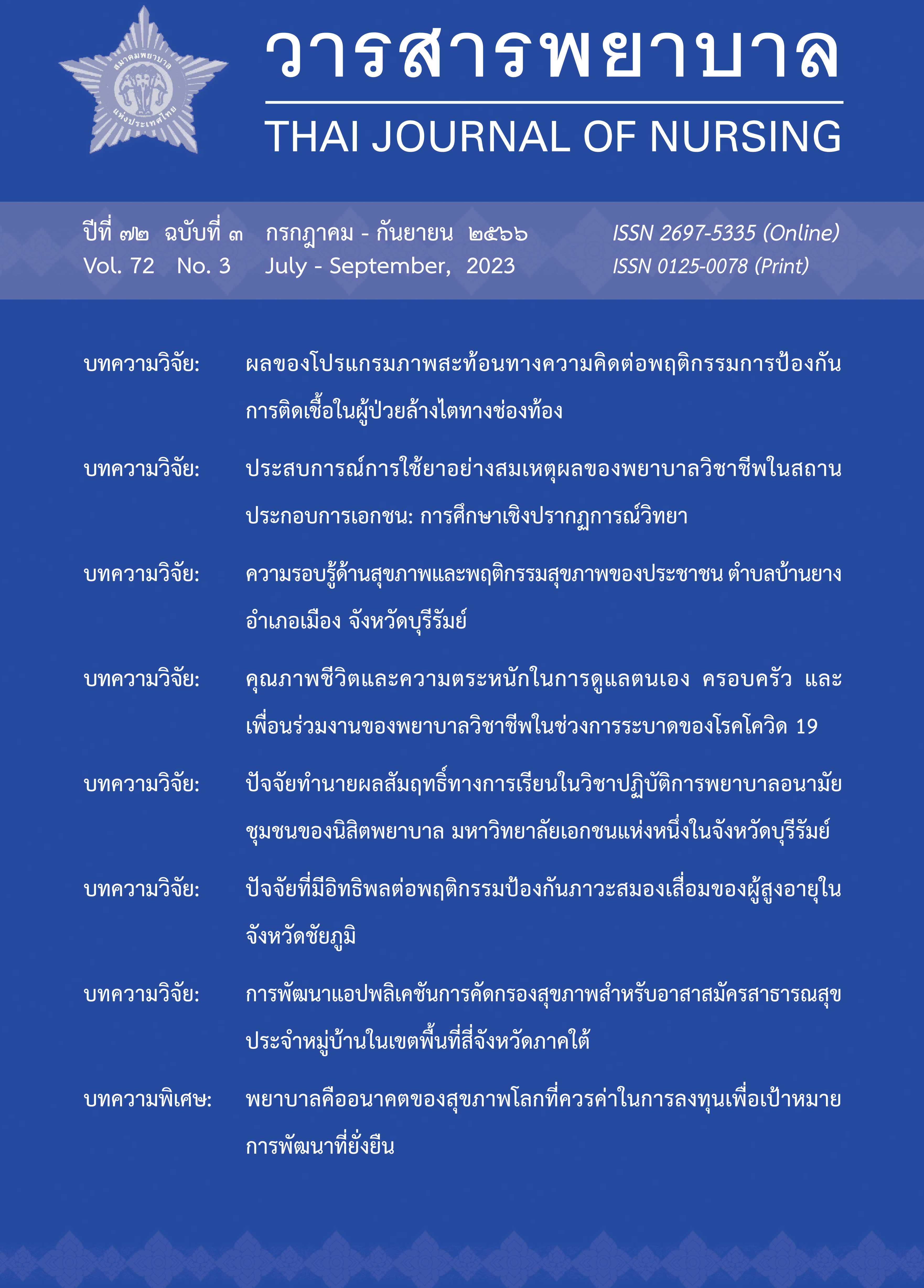Quality of life and self-care awareness, family and colleague care of professional nurses during the COVID-19 Pandemic
Main Article Content
Abstract
The purposes of this descriptive research were to study quality of life and to study self-care awareness, family and colleagues care in preventing the spread of the COVID-19 of professional nurses during the COVID -19 pandemic. A sample of 1,339 professional nurses who were working in health system, was selected by volunteer sampling. The research tools included 1) general information questionnaire, 2) Professional Quality of Life Scale: Compassion Satisfaction and Fatigue version 5 (ProQOL) and 3) the questionnaire on self-care awareness, family and colleague care. Data were analyzed using descriptive statistics. Research results revealed that the majority of professional nurses (71.82 %) had quality of life in the subpart of compassion satisfaction at a moderate level. Regarding to compassion fatigue subpart of quality of life, 85.50% and 61.14% of them reported a moderate level of burnout and a low level of secondary traumatic stress dimension respectively. In regard to self-care awareness, the majority of professional nurses reported wearing face masks every time before going outside (95.7%) while only 49.1 percent of them reported regularly using separate dishes, glasses, cups, and eating utensils.
Article Details

This work is licensed under a Creative Commons Attribution-NonCommercial-NoDerivatives 4.0 International License.
References
กระทรวงสาธารณสุข กรมควบคุมโรค. (2563). คู่มือเจ้าหน้าที่สาธารณสุข ในการตอบโต้ภาวะฉุกเฉิน กรณีการระบาด โรคติดเชื้อไวรัสโคโรนา 2019 ในประเทศไทย. https://www.skho.moph.go.th/eoc/?page_id=769
กระทรวงสาธารณสุข กรมควบคุมโรค. (2564, 30 เมษายน). รายงานสถานการณ์โรคติดเชื้อไวรัสโคโรนา 2019. https://ddc.moph.go.th/viralpneumonia/file/situation/situation-no483-300464.pdf
กระทรวงสาธารณสุข กรมสุขภาพจิต. (2563). แนวทางการฟื้นฟูจิตใจในสถานการณ์การระบาดของโรคติดเชื้อไวรัสโคโรนา 2019 (Combat 4th wave of COVID-19: C4). เอวัน ปริ้นติ้ง.
นราจันทร์ ปัญญาวุทโส, ปรัชญานันท์ เที่ยงจรรยา, และ ประภาพร ชูกำเนิด. (2565). ประสบการณ์ของพยาบาลวิชาชีพในการมีส่วนร่วมด้านความปลอดภัยในภาวะวิกฤตของการแพร่ระบาดโรคโควิด 19 โรงพยาบาลหาดใหญ่ ประเทศไทย. วารสารมหาวิทยาลัยคริสเตียน, 28(1), 59-72.
นิตยา เพ็ญศิรินภา . (2564). ภาวะเหนื่อยล้าจากงานของบุคลากรสุขภาพในช่วงโรคโควิด 19 ระบาด. วารสารสภาการสาธารณสุขชุมชน, 3(3), 1-16.
วันนา จินดาเพิ่ม, เอมอร แสงศิริ, และ มยุรี ปริญญวัฒน์. (2563). โครงการวิจัยสำรวจความรู้ ความตระหนักในการดูแลตนเอง ครอบครัว และเพื่อนร่วมงาน ให้ห่างไกลโรคติดเชื้อไวรัสโคโรน่า 2019 (COVID-19). รายงานวิจัยฉบับสมบูรณ์ของโรงพยาบาลจุฬาลงกรณ์ สภากาชาดไทย.
วัลลภ รัฐฉัตรานนท์. (2562). การหาขนาดตัวอย่างที่เหมาะสมสำหรับการวิจัย: มายาคติในการใช้สูตรของ ทาโร ยามาเน่ และเครทซี-มอร์แกน. วารสารสหวิทยาการวิจัย: ฉบับบัณฑิตศึกษา, 8(1), 11-28.
อรัญญา ตุ้ยคัมภีร์ และ ศิริลักษณ์ เตชะธนอิทธิกุล. (2562). การตรวจสอบคุณภาพเบื้องต้น มาตรวัดความเหนื่อยล้าในการเห็นอกเห็นใจในนักวิชาชีพผู้ให้บริการด้านสุขภาพจิต. วารสารสุขศึกษา, 42(1), 1-12.
เอกลักษณ์ แสงศิริรักษ์ และ สิรินรัตน์ แสงศิริรักษ์. (2563). ความเครียดและอารมณ์เศร้าของบุคลากรทางการแพทย์ ในช่วงการระบาดของโรคติดเชื้อไวรัสโคโรนา 2019. วารสารสมาคมจิตแพทย์แห่งประเทศไทย, 65(4), 400-408.
เอมอร แสงศิริ, สุทธิดา พงษ์พันธ์งาม, และ วิไลพร โรจนศรีรัตน์. (2564). การพัฒนาแบบวัดคุณภาพชีวิตของผู้ประกอบวิชาชีพ (ความสุขใจและความเหนื่อยล้าต่อความรู้สึกเห็นอกเห็นใจผู้อื่น) ฉบับภาษาไทย. รายงานกรณีศึกษาการแปลเครื่องมือวิจัยต่างประเทศ ศูนย์พัฒนางานวิจัยและนวัตกรรมทางการพยาบาล ฝ่ายการพยาบาล โรงพยาบาลจุฬาลงกรณ์ สภากาชาดไทย.
Badahdah, A., Khamis, F., Al Mahyijari, N., Al Balushi, M., Al Hatmi, H., Al Salmi, I., Albulushi, Z., & Al Noomani, J. (2021). The mental health of health care workers in Oman during the COVID-19 pandemic. The International Journal of Social Psychiatry, 67(1), 90–95.
Crabtree-Nelson, S., DeYoung, P. M., Vincent, N. J., Myers, T. P., & Czerwinskyj, J. (2022). Compassion fatigue, compassion satisfaction, and burnout: A study of nurses in a large Texas health-care system. Journal of Nursing Scholarship, 54(6), 720–727. https://doi.org/10.1111/jnu.12780
Milutinović, D., Marcinowicz, L., Jovanović, N. B., & Dragnić, N. (2023). Impact of compassion satisfaction and compassion fatigue on satisfaction with life in Serbian and Polish nurses: A cross-
sectional study. International Nursing Review, 70(2), 194–203. https://doi.org/10.1111/inr.12793
Murat, M., Köse, S., & Savaşer, S. (2021). Determination of stress, depression and burnout levels of front-line nurses during the COVID-19 pandemic. International Journal of Mental Health Nursing, 30(2), 533–543. https://doi.org/10.1111/inm.12818
Pappa, S., Ntella, V., Giannakas, T., Giannakoulis, V. G., Papoutsi, E., & Katsaounou, P. (2020). Prevalence of depression, anxiety, and insomnia among healthcare workers during the COVID-19 pandemic: A systematic review and meta-analysis. Brain, Behavior, and Immunity, 88, 901–907. doi:10.1016/j.bbi.2020.05.026
Ruiz-Fernández, M. D., Ramos-Pichardo, J. D., Ibáñez-Masero, O., Cabrera-Troya, J., Carmona-Rega, M. I., & Ortega-Galán, Á. M. (2020). Compassion fatigue, burnout, compassion satisfaction and perceived stress in healthcare professionals during the COVID-19 health crisis in Spain. Journal of Clinical Nursing, 29(21-22), 4321–4330. doi: 10.1111/jocn.15469
Stamm, B. H. (2012). Professional Quality of Life: Compassion Satisfaction and Fatigue Version 5 (ProQOL). https://proqol.org/
World Health Organization. (2020). Coronavirus disease (COVID-2019) situation reports. https://www.who.int/emergencies/diseases/novel-coronavirus-2019/situation-reports
Xia, W., Defang, W., Xiaoli, G., Jinrui, C., Weidi, W., Junya, L., Luhong, H., & Hui, W. (2022). Compassion satisfaction and compassion fatigue in frontline nurses during the COVID-19 pandemic in Wuhan, China. Journal of Nursing Management, 30(7), 2537–2548. doi: 10.1111/jonm.13777


